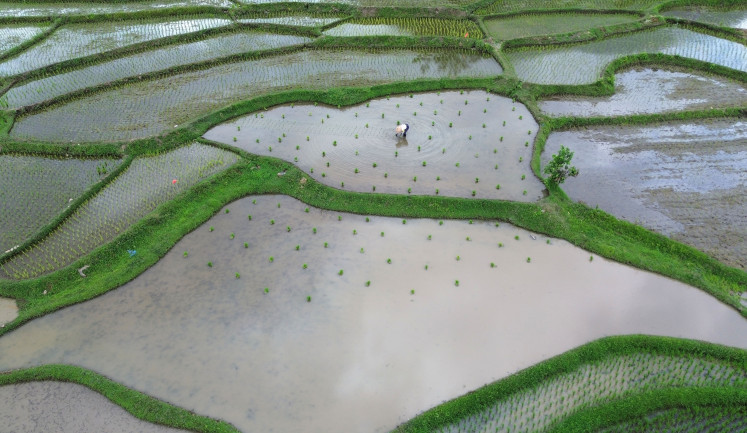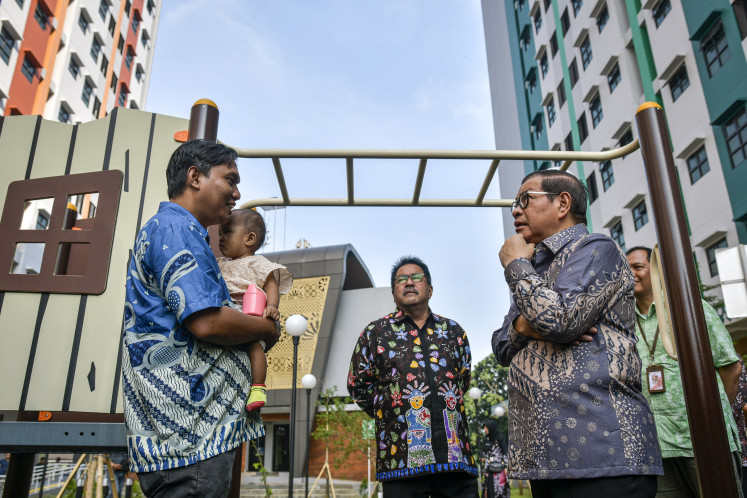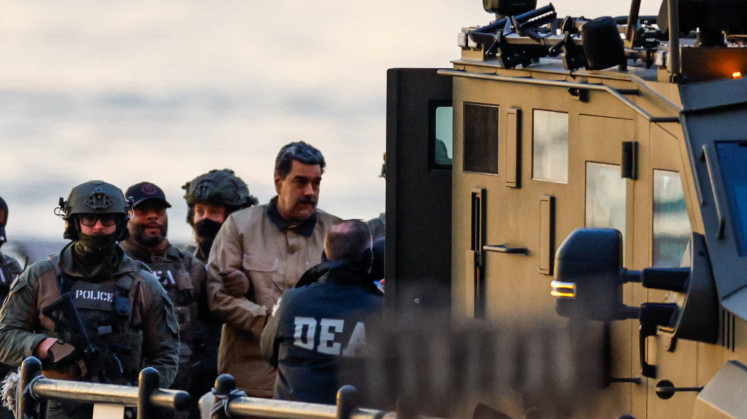Popular Reads
Top Results
Can't find what you're looking for?
View all search resultsPopular Reads
Top Results
Can't find what you're looking for?
View all search resultsWomen and security: Ensure programs not merely on paper
Lack of digital literacy, lack of knowledge and comprehensive understanding of their religious beliefs, poor access to a productive economy and justice have augmented the feelings of deprivation and hopelessness.
Change text size
Gift Premium Articles
to Anyone
A
n attack by a couple of men against the former chief security minister in Banten last October, the suicide bombing by a young online motorcycle taxi driver in Medan who was believed to have been radicalized by his wife and last year’s suicide bombing in Surabaya involving families, including children, are among the incidents that confirm no one can ignore violent extremism and religious radicalism in Indonesia.
In all cases women have evolved to become perpetrators of such extreme acts. The internet and social media have been used by extremist groups to lure new recruits into their ranks, often including violent notions of masculinity for recruiting young women and men.
Hence, the social media controlled by these groups has managed to transform the mindsets of many young women and men to become more radicalized in their religious beliefs and promote intolerance.
Lack of digital literacy, lack of knowledge and comprehensive understanding of their religious beliefs, poor access to a productive economy and justice have augmented the feelings of deprivation and hopelessness.
Concerned by the increasing and unprecedented threats posed by conflicts, the rise of violent extremism and the increasing number of refugees and displaced persons, including women and children, and recognizing that peace and security are essential to achieve sustainable development, ASEAN leaders signed a Joint Statement on Women, Peace and Security (WPS) in 2017.
The statement encourages member states to integrate gender equality in all conflict prevention initiatives and strategies and ensure women’s full participation in peace processes, such as conflict prevention and post conflict reconstruction and rehabilitation.
This statement also encourages member states to foster the capacity of women as peace builders, agents of peace and peace negotiators.
The ASEAN Commission on the Promotion and Protection of the Rights of Women and Children (ACWC) then convened a regional symposium on the WPS agenda and is now in the process of undertaking a regional study to identify progress, opportunities and challenges in advancing women’s roles in peace mediation in Southeast Asia, together with Cambodia and Indonesia.
The ACWC then worked with different parties to draft the “Bali work plan to prevent and counter the rise of radicalization and violent extremism, 2019-2024”.
Almost a decade ago the United Nations Security Council issued Resolution 1325/2000 on Women, Peace and Security. This is a significant international normative and policy framework that addresses the gender-specific impacts of conflict, political crisis, displacement, disaster and violent extremism on women and girls.
The resolution urges member states to implement the agenda through more systemic and concrete actions and reporting, calling for women’s full and meaningful participation and leadership in all efforts to maintain peace and security.
As part of Indonesia’s commitments as a member of both ASEAN and the UN, the government enacted Presidential Decree No. 18/2014 on the Protection and Empowerment of Women and Children in Social Conflict, followed by two government regulations in the same year, respectively on the Establishment of Working Group and National Action Plan on the Protection and Empowerment of Women and Children in Social Conflict, 2014-2019.
The action plan contains prevention, protection, participation, rehabilitation and reconstruction programs and activities, to be held in collaboration with civil society and private sector organizations.
Critics have pointed out that not all the concerned government agencies have been allocated sufficient and sustainable budgets and human resources so that many of their programs remain on paper. The action plan’s implementation should be carried over and funded for the period of 2019 to 2024, and effective monitoring and evaluation mechanism should be in place.
As agents of peace in the community, women’s participation and representation in the community should be recognized and enhanced. One best practice is an initiative by the Wahid Foundation led by Zannuba Ariffah Chafsoh, known as Yenny Wahid, a daughter of former president and cleric Abdurrahman “Gus Dur” Wahid.
This foundation initiated the “peace villages”, to instill Gus Dur’s values, namely tolerance, democracy, diversity, inclusivity, justice, equality, peace, pluralism and love through women in the community, values similar to the global WPS agenda.
Women play important roles in raising children and educating the youths in the villages and they also communicate with their husbands and community about these values.
To enable such peace villages to survive and progress, the foundation started by empowering the women’s economic productivity. In nine pilot villages across West, Central and East Java, they are trained to become micro and small entrepreneurs so that they are economically independent and cannot be easily influenced by extremists manipulating feelings of jealousy, for instance, against migrants who may be perceived to be more successful.
They are also trained in these core values so that they can spread them to their families and communities. Many of the pilot villages housing residents of different faiths have shown more tolerance and moderation amid differences, as opposed to intolerance and radicalized religious values. This is one strategy to counter radicalization and violent extremism at the community level.
The “peace villages” show women can play powerful roles in preventing violent extremism and in promoting peace and equality. They are uniquely positioned to influence community and family values, and can identify early signs of extremist views that can lead to terrorism; they can gather intelligence as security sector actors that is unattainable by their male counterparts, preach tolerance as leaders of various faiths and create counter-narratives for an audience of young women and men from a female perspective.
Promoting gender equality and empowering women in itself is a countermeasure to the spread of extremist views. We also need to expand campaigns on peace and tolerance to various stakeholders, including activists and artists who can reach diverse audiences through music, art, film, comics and humor.
In adopting strategic communications to spread these positive messages of peace, narratives must both feature women and be tailored to female audiences.
Musical lyrics, for example, can encourage women to be active and promote women’s and girls’ empowerment to combat gender-based violence and discrimination.
Through songs or film plots women and young girls can also spread tolerance, justice and inclusion. Messages of nationalism and heroism, typically associated with men, can involve both women and men.
___________________
Indonesian representative for women’s rights on ASEAN Commission on the Promotion and Protection of the Rights of Women and Children.










